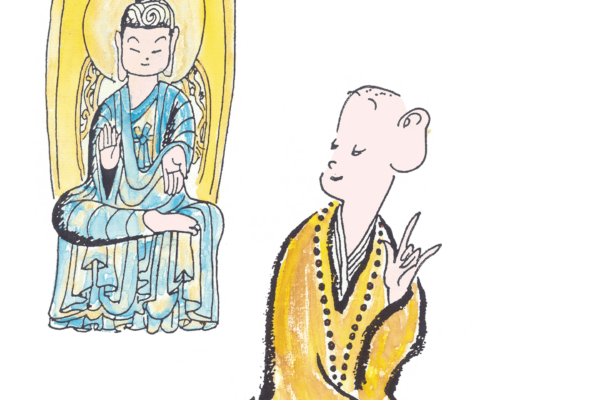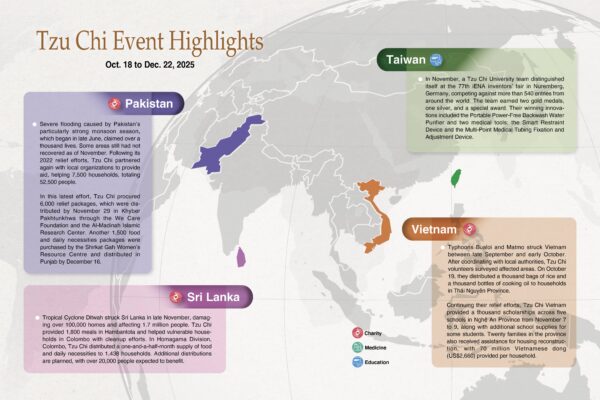By Lamiya Lin
Translated by Wu Hsiao-ting
Photos by Chen Chiou Hwa
One of them is the son of a Palestinian refugee, while the other is the pillar of a single-parent Syrian refugee family. Despite the impact of war on their lives, they’ve found peace through Tzu Chi.
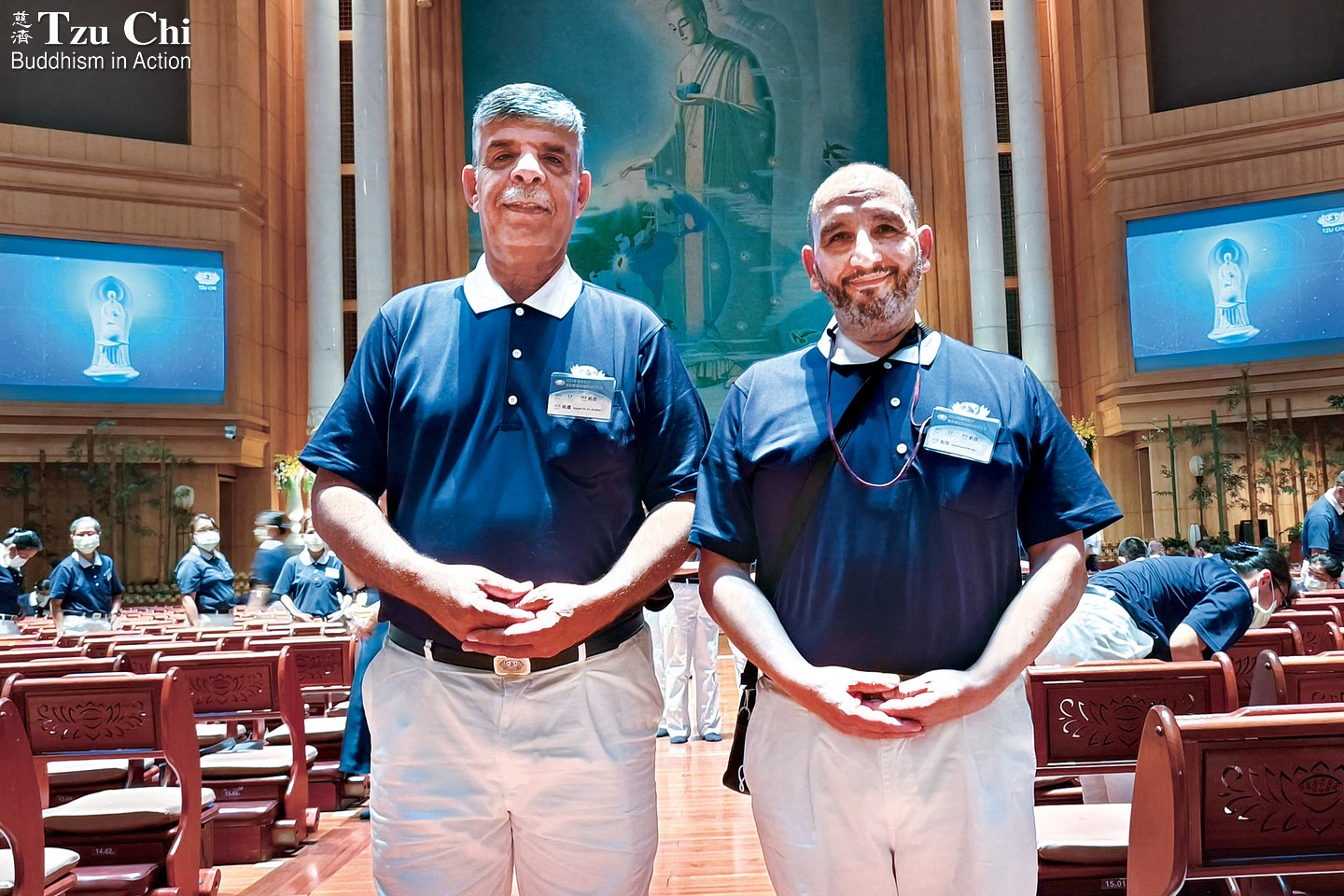
Risking the possibility of not being able to return to Jordan, Mohamed Khir Alriz (right) arrived in Hualien, Taiwan, in June to participate in a Tzu Chi camp for overseas volunteers and receive his volunteer certification from Dharma Master Cheng Yen. Khader Khalifeh (left), who has been supporting Tzu Chi for over two decades, received his volunteer certification at the same time.
Their journey to Taiwan in June commenced in Amman, Jordan, and spanned a total of 48 hours, including layovers in Bahrain, Singapore, and Thailand. But Khader Khalifeh, a 60-year-old Jordanian, and Mohamed Khir Alriz, a 58-year-old Syrian, were undaunted by the long journey. Their ultimate destination was Hualien, where the Jing Si Abode—the spiritual home of all Tzu Chi volunteers—is located. At the Jing Si Hall in Hualien, they received their volunteer certifications from Dharma Master Cheng Yen.
The two men also participated in a Tzu Chi camp for overseas volunteers during their visit to the island. Their plan was to leave for Jordan after the camp was over, but Mohamed still hadn’t received permission to re-enter Jordan when the camp concluded. Despite the uncertainty, the two of them decided to adhere to their original itinerary, and set off for Taoyuan Airport after the camp to begin their journey back to Jordan. Khader tried to reassure Mohamed by telling him, “Don’t worry. The Jordanian Ministry of the Interior has responded, and your visa will be approved.” Nevertheless, a sense of unease continued to hover over them.
War and poverty
Khader is a retired teacher who taught at a public school in Amman. At the age of 16, he started learning Taekwondo under the guidance of Chen Chiou Hwa (陳秋華), a martial arts instructor for the security detail of Prince El Hassan bin Talal of Jordan. Khader excelled in the sport. Eventually, he became a coach for the Jordanian Taekwondo national team, a role he held for 21 years.
Khader’s father was originally from Palestine, but was compelled to uproot his family and escape from Jerusalem to Jordan due to the 1948 Arab-Israeli War. The eldest of ten children in his family, Khader shouldered the responsibility of caring for his siblings from a young age. Reflecting on his humble beginnings, he said, “As a child, I sold newspapers in the city center to make a living. During summer and winter breaks, I worked as a laborer on construction sites with my uncle, carrying bricks and mixing cement to earn some pocket money. In my teenage years, I sold popsicles near the elementary school close to my home.” Growing up in such challenging circumstances, he developed a profound understanding of the resilience required to survive in adverse conditions.
Khader’s educational journey was equally challenging. He couldn’t obtain his bachelor’s degree until he was admitted to a university that provided government-subsidized transportation expenses. After he graduated from the university, he started teaching at a public vocational school while also coaching at Chen Chiou Hwa’s Taekwondo studio. It was during this time that his life began to improve. Chen Chiou Hwa, 14 years Khader’s senior, was not only a mentor and friend, but also like a father and an older brother.
Chen was a Tzu Chi volunteer originally from Taiwan, so in addition to coaching at his Taekwondo studio, Khader joined him in carrying out charity work for the foundation. Their efforts included purchasing new clothes for underprivileged children as Ramadan approached, offering financial support to students who couldn’t afford university tuition, and providing emergency aid to families of students facing crises. During his involvement in Tzu Chi activities, Khader witnessed extreme poverty in underserved regions. “It fostered in me a sense of gratitude for my own circumstances and a stronger desire to help those in need,” he reflected. As he engaged in Tzu Chi’s philanthropic endeavors, Master Cheng Yen’s compassion and Chen’s selfless dedication gradually seeped into his heart.
Time flew quickly. In the blink of an eye, two decades passed.
When lockdown measures were imposed in 2020 during the COVID-19 pandemic, restrictions prevented Chen from being physically present for relief distributions. Consequently, he entrusted Khader and Abu Tamar, another volunteer, with the responsibility of obtaining travel permits through a police acquaintance and carrying out aid distributions to over 1,600 households across 15 locations.
During this time, public transportation was halted and roads were restricted due to the pandemic. But that didn’t stop Chen. He once walked for three hours under the scorching sun, disregarding his leg pain, to reach a bank and withdraw money for the relief efforts. This selfless act, undertaken solely for the well-being of others, deeply moved Khader and sparked his desire to learn more about Tzu Chi. He pondered, “What could drive a 70-year-old man to endure leg pain and invest so much care and effort for the benefit of needy people and Syrian refugees in Jordan?”
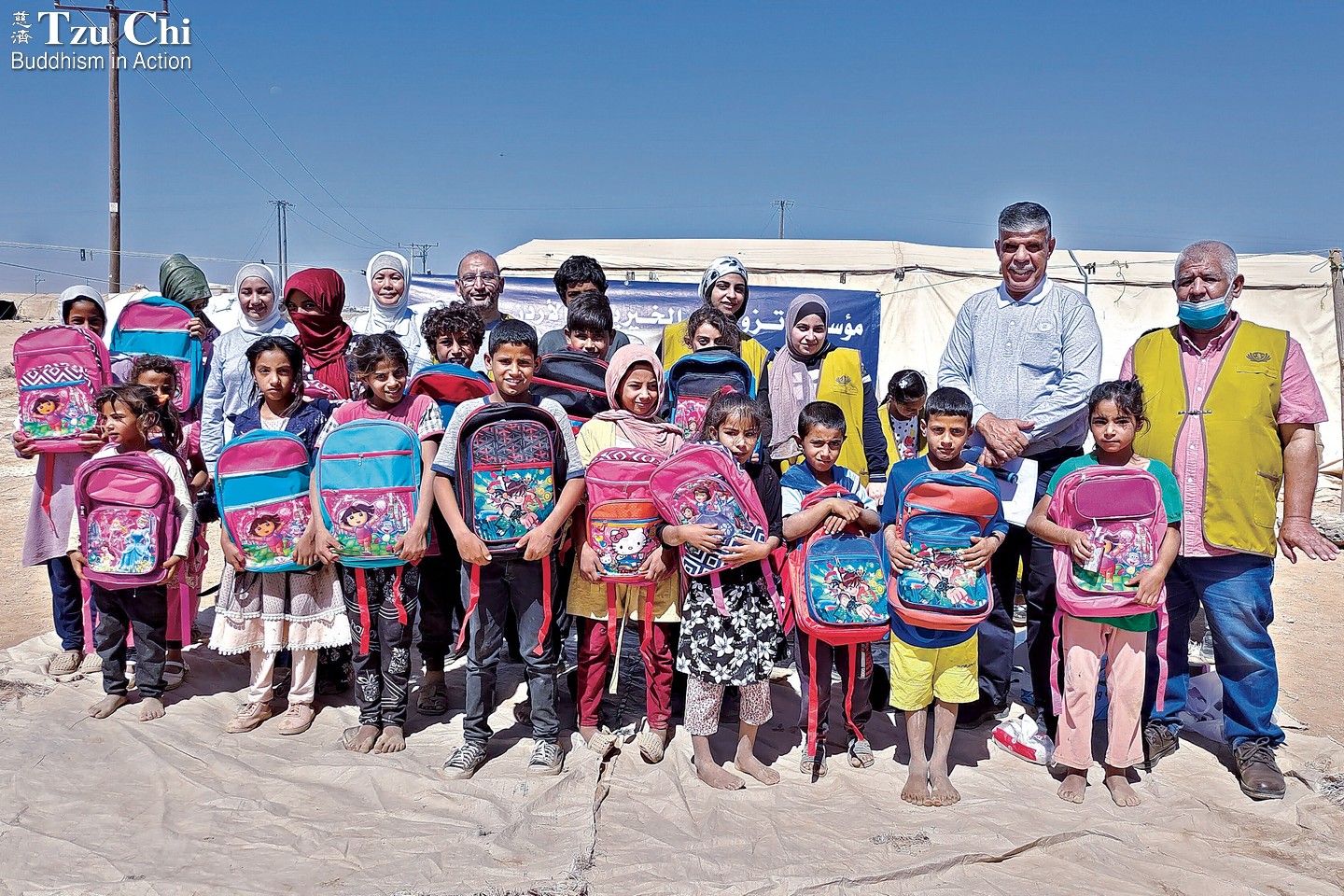
Tzu Chi has long been caring for Bedouin people in the Jordanian border city of Mafraq. This picture shows Mohamed Khir Alriz (back row, sixth from left) and Khader Khalifeh (back row, second from right) participating in a distribution of school supplies for underserved children there.
Tzu Xin House
In July 2021, Taekwondo classes were introduced at Tzu Xin House, a shelter supported by Tzu Chi for Syrian single mothers and their children. This gave Khader more opportunities to participate in Tzu Chi activities. Tzu Chi volunteers shared five aphorisms by Master Cheng Yen during each distribution event at Tzu Xin House. The inspirational sayings not only resonated with the children there but also helped local volunteers understand better how Tzu Chi is an inclusive family transcending race and religion. In October of the same year, Khader began his training to become a certified Tzu Chi volunteer. He was accompanied in his training by Mohamed, the head of Tzu Xin House.
Mohamed’s father, Mohammad Bashir Roz, was born in a destitute district in Damascus, Syria. In his youth, he mended shoes to make ends meet. He persevered in his studies despite his poverty, ultimately earning three bachelor’s degrees in Arabic literature, Islamic law, and law. He later became a renowned scholar at the University of Damascus. When he passed away in 2011, half of Damascus’s residents took to the streets to bid him farewell.
“My father’s story inspired me to study hard and work diligently,” Mohamed said.
In 1990, due to political instability in Syria, Mohamed took his father’s advice and left his home country. He spent the next 17 years working as an Arabic language teacher in Dubai. In 2007, he returned to Syria and founded a publishing house. Unfortunately, the Syrian civil war erupted just four years later, forcing him back to Dubai. After grappling with months of unemployment there, he returned to Syria in 2012 before eventually crossing into Jordan with his entire family. They initially settled in the Zaatari Camp and later relocated to Amman.
Mohamed’s brother-in-law was a successful businessman. In 2012, the brother-in-law and three of his friends pooled together resources and leased a building in Amman’s Ein Basha region to provide shelter to Syrian refugee widows and orphans. They named it Beit Safout, and it marked the inception of Tzu Xin House. Mohamed took on the responsibility of managing it.
Initially, everyone thought the war would end soon, but it dragged on, year after year. In 2016, Mohamed’s brother-in-law and his friends could no longer afford the rent for Beit Safout. Mohamed turned to Tzu Chi for assistance, asking if they could support the refugee families at the shelter. The foundation decided to help.
Tzu Chi volunteers, including Chen Chiou Hwa, delivered food packages to Beit Safout in December 2016. Mohamed fondly recalled, “The first time I came into contact with Tzu Chi, I immediately sensed that it was a distinctive charitable organization. It was evident that they genuinely cared. They treated other people’s children as their own.” With Tzu Chi’s support, Beit Safout gradually stabilized. The foundation helped with rent payments and provided essential supplies. They also offered free medical clinics at the shelter and sponsored educational fees. In 2017, Beit Safout was renamed Tzu Xin House, meaning “compassionate hearts.”
According to their records, Tzu Xin House accommodated 33 refugee families at the end of July 2023. By that time, Tzu Chi had extended further support to the single mothers living there by offering vocational training in sewing, beauty and hairdressing, home care, and cooking, aiming to fortify them with skills for self-sufficiency.
Thanking Master Cheng Yen in person
It has been over seven years since Mohamed began volunteering for Tzu Chi. He holds great admiration for Master Cheng Yen’s guidance, stating that what she teaches embodies the pure essence of religion. He further elaborates that the Master encourages everyone to love all lives, curb their desires, and help purify every heart and mind. He believes that this is the path to creating a better world. “The Master is our mentor, leading all Tzu Chi brothers and sisters to help those in need, no matter where they are. I’m deeply grateful for her guidance,” he emphasized.
In February of this year, major earthquakes struck Türkiye and Syria. On February 28, four military trucks loaded with Tzu Chi relief supplies entered Syria from Jordan. In March, another 18 trucks delivered clothing, blankets, shoes, gloves, and hats to the disaster-stricken area.
“Look! That’s Syria!” Mohamed exclaimed with excitement, pointing to the land on the other side of the Jabir border crossing in northern Jordan. He called out to Tzu Chi employee Lamiya Lin (林綠卿), who was with him, and asked her to take a photo of him with Syria in the background. Tears welled up in his eyes as he gestured toward his home country.
“Since the outbreak of the war,” he said, “all Syrians have come to truly understand how precious a sense of security is. We all yearn so much for an end to the conflict and a return to peace.” Witnessing foreign aid crossing the border into his home country after the quakes, he was overcome with emotion. “My three sisters are still in Syria; they live in a relatively safe area without conflict, so I don’t worry about their safety. However, it has been 12 years since we last saw each other. I really miss them.” Mohamed added, expressing the sentiments of millions of Syrians living in exile: “I lost everything in Syria. There’s no compelling reason to return. Besides, if I did, I wouldn’t be able to come back to Jordan.”
Jordanian policy states that when Syrians holding refugee permits depart Jordan, they must surrender their refugee permits and sign a declaration indicating that they will not return to Jordan as refugees. Knowing this, Mohamed anxiously awaited the visa that would grant him re-entry to Jordan before his planned journey to Taiwan in June. Despite his apprehensions about re-entry, he resolved that he would proceed with his trip to Taiwan even if the visa did not arrive by the deadline. His determination to visit the island was resolute—he wanted to visit the Jing Si Abode and personally convey his heartfelt gratitude to Master Cheng Yen for her unwavering support of Syrian refugees over the years.
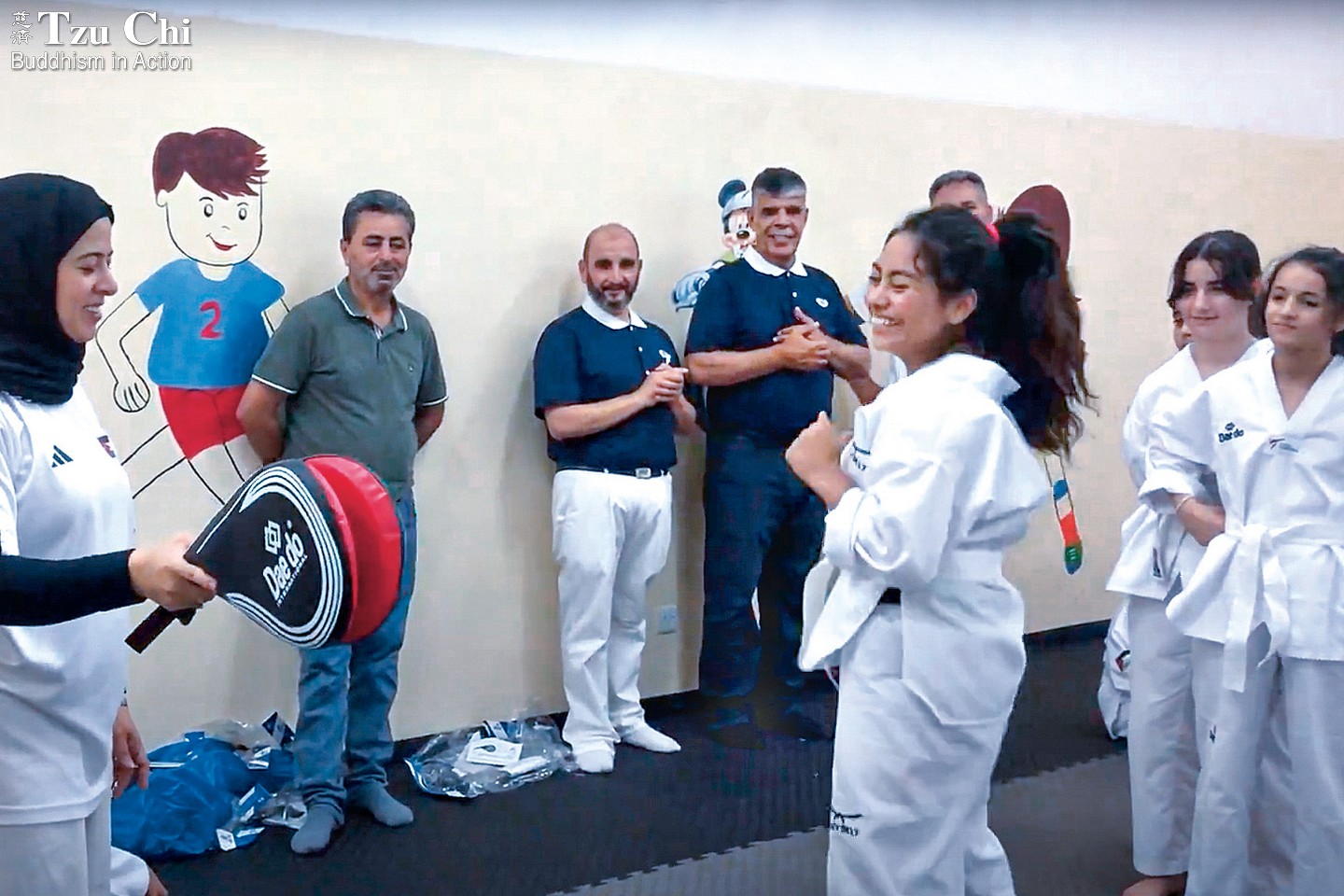
Khader Khalifah (fourth from left) and Mohamed Khir Alriz (third from left) accompanied children from the Tzu Xin House Taekwondo class to a government girls’ shelter in Irbid, northern Jordan, for an exchange event. Lamiya Lin
One family
Because he was still waiting for his visa, Mohamed chose not to depart for Taiwan with the other volunteers. Khader couldn’t bear the thought of him later embarking on the long journey alone, so he voluntarily postponed his own departure to Taiwan in order to accompany him.
Mohamed was deeply moved during the five-day camp in Taiwan. “I feel the harmony in Tzu Chi. Regardless of where we come from, we are one family here, united by a common goal to purify people’s hearts and minds. The courses offered at the camp are so valuable; I wish I didn’t have to leave, but could keep listening.” He also praised Tzu Chi’s organizational and coordination abilities, remarking, “In today’s world, there are very few organizations like Tzu Chi. I feel peace here, in this paradise-like Tzu Chi world.”
After the conclusion of the camp, Mohamed and Khader began their journey back to Jordan. During their layover at Bangkok Airport in Thailand, a troubling incident deeply worried Mohamed. “I saw a Syrian man being escorted away by airport security, set to be deported back to his country of origin.”
Chen Chiou Hwa, who had also visited Taiwan and was still there, was equally filled with worry. He contacted Princess Sumaya bint Hassan of Jordan, Prince El Hassan bin Talal’s daughter, seeking assistance to ensure Mohamed’s safe return to Jordan. The Prince’s office dispatched two personnel to pick up Mohamed and Khader at the airport upon their return to Jordan. Eventually, the two successfully passed through security and immigration inspections, exiting on June 28 at noon.
As soon as they emerged from the airport, they informed everyone of their safe return. Their fellow volunteers in Taiwan and Jordan, who had anxiously awaited their news, finally breathed a collective sigh of relief.
Mohamed wrote a message to Master Cheng Yen after their safe return: “We often say that those who do not appreciate others do not truly understand how to appreciate the Lord. First and foremost, I want to express my gratitude to you, Master. Your compassionate care for us deeply touched my heart. I wholeheartedly believe that you deserve the love, respect, and gratitude of people around the world.”
The trip to Taiwan also left a deep impression on Khader. He mentioned something the Master said to the attendees of the five-day camp: “If you love me, then please be sure to extend that love to the people I love—the suffering beings of the world.” This message became etched in his mind and helped him understand the reason behind Chen Chiou Hwa’s tireless work for the needy—he was doing what the Master wants them to do: to love and assist the suffering people of the world.
Having weathered life’s hardships, Khader and Mohamed have transitioned from being recipients of help to lending a hand to others. An inspiration to those who continue to grapple with adversity, they have emerged as among the gentlest and yet strongest pillars within the Tzu Chi team in Jordan.

